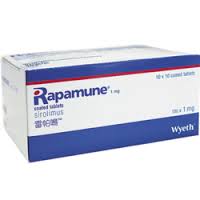Sirolimus
Sirolimus, also known as rapamycin, is an immunosuppressant drug used to prevent rejection in organ transplantation; it is especially useful in kidney transplants. It prevents activation of T cells and B cells by inhibiting their response to interleukin-2 (IL-2). Sirolimus is also used as a coronary stent coating. Sirolimus works, in part, by eliminating old and abnormal white blood cells. Sirolimus is effective in mice with autoimmunity and in children with a rare condition called autoimmune lymphoproliferative syndrome (ALPS).
USFDA Approved Manufacturer : Zydus Healthcare
Delivery Time : Express Shipping (5-12 Working Days).
Manufacturer: Zydus Healthcare
Availability: In Stock
Rating: 1 Reviews / Write a review
Sirolimus 1 mg
| No of Units | Price / Unit | Price | Free Bonus | |
|---|---|---|---|---|
| 18 Pills | $8.00 | $144.00 | - | |
| 36 Pills | $7.19 | $259.00 | - | |
| 54 Pills | $6.91 | $373.00 | - | |
| 72 Pills | $6.60 | $475.00 | - |
| No of Units | Price | |
|---|---|---|
| 18 Pills - | $144.00 | |
| 36 Pills - | $259.00 | |
| 54 Pills - | $373.00 | |
| 72 Pills - | $475.00 |
Sirolimus available in 1mg tablet.
A macrolide, sirolimus was discovered by Brazilian researchers as a product of the bacterium Streptomyces hygroscopicus in a soil sample from Easter Island. Unlike the similarly named tacrolimus, sirolimus is not a calcineurin inhibitor, but it has a similar suppressive effect on the immune system. Sirolimus inhibits the response to interleukin-2 (IL-2), and thereby blocks activation of T and B cells. In contrast, tacrolimus inhibits the secretion of IL-2. The mode of action of sirolimus is to bind the cytosolic protein FK-binding protein 12 (FKBP12) in a manner similar to tacrolimus. Unlike the tacrolimus-FKBP12 complex which inhibits calcineurin (PP2B), the sirolimus-FKBP12 complex inhibits the mammalian target of rapamycin (mTOR, rapamycin being an older name for sirolimus) pathway by directly binding the mTOR Complex1 (mTORC1). mTOR has also been called FRAP (FKBP-rapamycin associated protein), RAFT (rapamycin and FKBP target), RAPT1, or SEP. The earlier names FRAP and RAFT were coined to reflect the fact that sirolimus must bind FKBP12 first, and only the FKBP12-sirolimus complex can bind mTOR. However, mTOR is now the widely accepted name, since Tor was first discovered via genetic and molecular studies of sirolimus-resistant mutants of Saccharomyces cerevisiae that identified FKBP12, Tor1, and Tor2 as the targets of sirolimus and provided robust support that the FKBP12-sirolimus complex binds to and inhibits Tor1 and Tor2.





